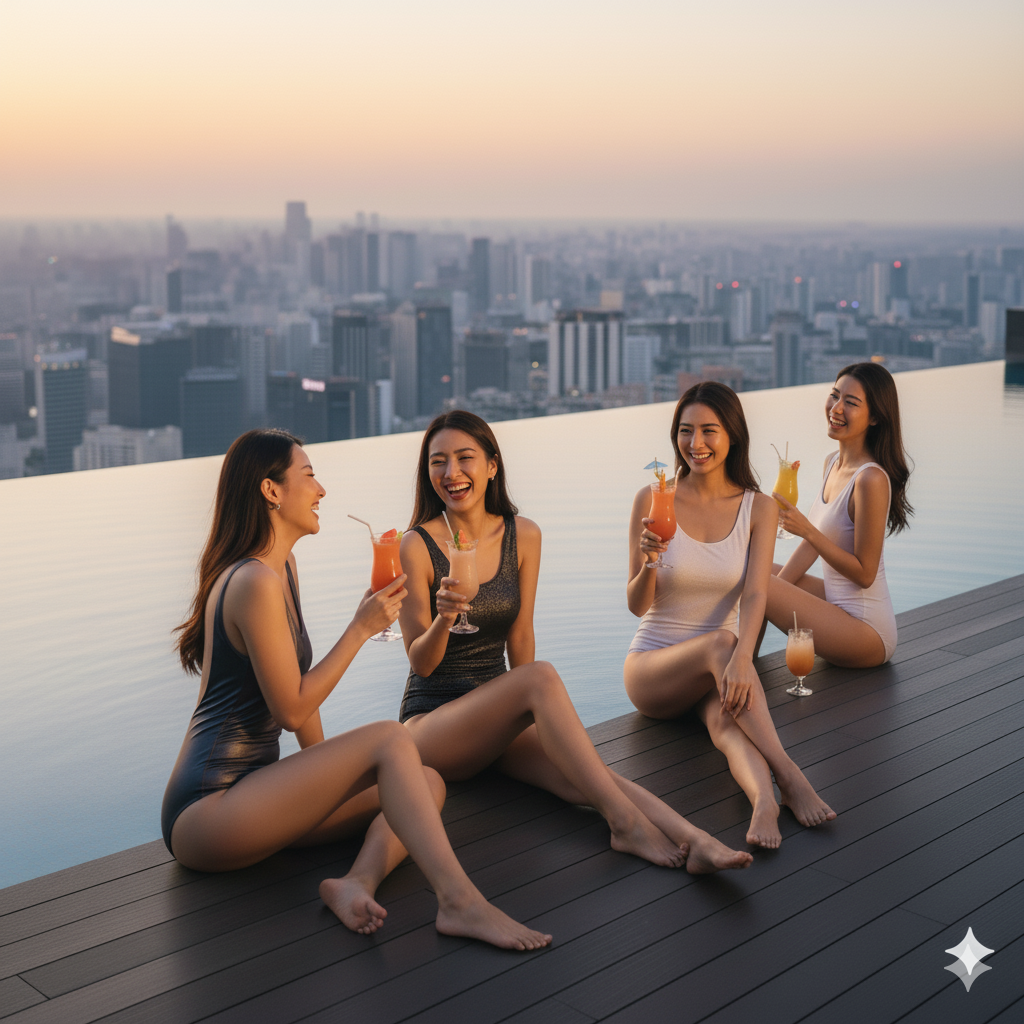
Tokyo’s Japanese love hotels are short-stay, private rooms bookable for a few hours (“rest”) or overnight (“stay”). They are designed for privacy, themed interiors, and convenience—typically self-service check-in, discrete payment, and in-room amenities. This guide explains major neighborhoods, how the pricing works, how to book, and polite etiquette so you can use them confidently.
How love hotels work in modern Japan (space, system, and “staged privacy”)
Within Japan’s nighttime urban culture, love hotels function as privacy-centered, time-based accommodations. Unlike ordinary hotels, they are purpose-built for short blocks of time. The architecture emphasizes concealed entrances, direct-to-room routing, touch-panel room selection, and automated payment. Interiors range from minimalist to elaborate concept rooms (open-air baths, karaoke, projectors, pole/fitness bars, or “healing” spa features). The service is generally non-staffed beyond reception, with amenities pre-staged: toiletries, vending machines, room service via phone or tablet, and rental items. Guests are mostly couples in their 20s–50s, plus travelers seeking privacy or a quirky stay. In contemporary practice, the love hotel is a socially standardized private micro-space within the city—legal, normalized, and decoupled from prostitution.
1. What is a Japanese love hotel in Tokyo?

Short answer: A love hotel is a short-stay private room facility offering Rest (1–4 hours) and Stay (overnight). Rooms focus on privacy, bathrooms with large tubs, on-demand rental items, and easy check-in/out. They are lawful accommodations distinct from brothels and do not sell sexual services.
Core features you’ll notice
- Discrete entrances, parking, or side streets; illuminated room-vacancy panels at the entrance.
- Automated kiosks, minimal conversation, and prepaid systems to reduce friction.
- Large tubs, jet baths, mood lighting, karaoke or big-screen projectors; rental cosmetics and chargers.
Common English signage
You’ll see “Rest,” “Stay,” “Service Time,” and “Late Check-in.” These are standardized time slots that determine pricing (see section 3).
Official examples (Tokyo)
Browse example systems and rooms on these official sites: Hotel Balian Group / Hotel SARA Shinjuku / Chapel Hotels (Tokyo).
2. Where should you go? Tokyo neighborhoods and access

Short answer: For first-timers, target Shinjuku–Kabukicho, Shibuya–Dogenzaka, Ikebukuro, and Ueno–Okachimachi. These zones have dense clusters, late hours, and easy station access.
Neighborhood snapshots
- Shinjuku–Kabukicho: Tokyo’s largest cluster; many themed rooms and foreigner-friendly chains. Example: Hotel SARA Shinjuku.
- Shibuya–Dogenzaka (“Love Hotel Hill”): Compact, trendy, walkable from Hachiko exit. Example: Balian Shibuya / Hotel ATOM.
- Ikebukuro East/West: Abundant mid-range options; convenient for late trains. Example: Petit Bali Ikebukuro.
- Ueno–Okachimachi: Value-oriented, easy JR access. Example: Balian Ueno.
How to get there smoothly
Use station exits that lead to the hotel cluster (e.g., Shibuya Mark City/Dogenzaka, Shinjuku East Exit→Kabukicho). Many official sites include access maps; see: SARA Shinjuku Access / Balian Shibuya Access.
Related internal guides: Kabukicho Nightlife Basics / Tokyo Red Light District Guide / Shibuya Love Hotel Hill Walk
3. How much does it cost? Price systems explained

Short answer: Expect Rest (1–4h) from roughly ¥4,000–¥10,000+ per room off-peak and Stay (overnight) from about ¥9,000–¥25,000+, depending on area, room grade, weekend surcharges, and season. Always confirm the hotel’s price chart on its official page before you go.
Understanding “Rest / Stay / Service Time”
- Rest: Short block. Many hotels show several tiers (e.g., 90, 120, 180 minutes).
- Service Time: A long day-time block (e.g., ~5–9 hours) at a discounted flat rate.
- Stay: Overnight (varies by day; late entry often required on weekends).
Sample official price pages (Tokyo)
| Hotel | Area | Official Rates Page | Notes |
|---|---|---|---|
| Hotel SARA Shinjuku | Kabukicho | Price Chart | Shows Rest/Stay tiers, member discounts, and time bands. |
| BALIAN Shibuya | Shibuya | Charges | Lists “Service Time” and late-night rules; English-friendly visuals. |
| Chapel Christmas | Multiple Tokyo | Tokyo Stores | Click each branch for Rest/Stay fees and equipment lists. |
Cost-saving tips
- Enter during Service Time on weekdays for the best value.
- Join free member programs at check-in kiosks for small discounts or drink tickets (varies by hotel).
- Room grade (Standard/Deluxe/Suite) changes rates more than location once you’re in the same neighborhood.
4. How to book or walk in: step-by-step & phrases

Short answer: Most love hotels are walk-in friendly. Select a vacant room on the lobby panel, pay at a machine or discreet counter, and go straight up. Some chains accept web reservations for themed rooms or overnight stays—check each hotel’s “Reservation/Price” page.
Walk-in flow (most common)
- Check the vacancy panel by the entrance. Choose a room number and press the button.
- Receive a card or QR slip; proceed to the elevator. Many hotels are cashless-friendly.
- Inside the room, amenities and instructions are printed near the TV or tablet. Extension charges apply if you overstay.
- Check out by phone/tablet or by returning the key/card to an automated box or staffed window.
Reservation flow (for themed rooms or weekends)
- Find the hotel’s official site and look for “Reservation / 空室情報 / Stay.” Examples: SARA Shinjuku Reservation / Balian Group.
- Enter date/time; some require member sign-ups or phone confirmation.
- Arrive on time with ID if requested (policy differs by hotel).
Useful Japanese phrases
- “Kūshitsu wa arimasu ka?” — Do you have a vacant room?
- “Rest desu. Nanjikan made desu ka?” — We’d like a Rest. Until what time?
- “Stay wa nanji kara hairaemasu ka?” — From what time can we check in for Stay?
- “Kurajitto kādo wa tsukaemasu ka?” — Do you accept credit cards?
More booking help: How to Book in Japan / Useful Phrases / Tokyo Love Hotel Map
5. Etiquette, safety, and what to expect inside

Short answer: Be discreet, respect time limits, keep noise low, and treat staff politely. Love hotels are private spaces for couples—they do not offer sexual services or “arrangements.” Food delivery, smoking, and visitors have house rules that vary by hotel—read the in-room guide.
Inside the room
- Large bath/shower with toiletries; towels replaced via hatch or front desk on request.
- VOD, karaoke, or projector; rental items via tablet or phone order; some offer costume rentals.
- Room service menus (soft drinks, desserts, simple meals). Payment can be room-charge or prepaid.
Etiquette essentials
- Punctuality: Overstays trigger automatic next-tier charges. Set an alarm.
- Cleanliness: Tidy towels and dispose of trash; staff appreciate basic courtesy.
- Privacy: Photography in public hallways is discouraged; keep volumes moderate.
- Guests: Most rooms are for two people. Extra guests or parties are usually not allowed.
Policies to check on official pages
Each hotel posts rules on ID, smoking, parking height limits, and payment types. See examples: SARA Shinjuku FAQ / Balian Shibuya FAQ.
6. Quick comparison of popular chains & sample rooms

Short answer: Choose by location and room style. Balian focuses on resort/spa feel, SARA on modern themed interiors, Chapel on playful concepts. Prices shift by room grade and time band—always check the hotel’s “Price” page the day you go.
Side-by-side snapshot (Tokyo)
| Brand / Hotel | Area | Style & Notable Amenities | Official Link |
|---|---|---|---|
| BALIAN (Petit Bali / Balian Resort) | Shinjuku, Shibuya, Ueno, Ikebukuro | Balinese resort vibe, aroma, welcome drinks, big baths | Balian Official |
| Hotel SARA Shinjuku | Kabukicho | Modern themed rooms, strong Rest/Stay charts, online info | SARA Shinjuku |
| Chapel Hotels (incl. Christmas) | Multiple Tokyo | Playful concept suites, karaoke/projectors | Chapel Tokyo |
| Meguro Emperor | Meguro | Historic architecture with renovated interiors | Meguro Emperor |
Room-selection tips
- If you want a jet bath or open-air bath, check the room list first; only certain numbers have them.
- For karaoke/projector, confirm equipment icons on the room panel or website.
- Weekend nights in Shibuya/Shinjuku fill quickly; consider Ueno or Ikebukuro for easier availability.
Summary and Next Steps
Bottom line: Japanese love hotels in Tokyo are legal, privacy-focused, and easy to use. Pick a dense area (Kabukicho, Dogenzaka, Ikebukuro, Ueno), check the Rest/Stay chart on the hotel’s official page, and follow the house rules. With a little planning, they’re one of the most convenient and uniquely Japanese ways to experience urban intimacy as a couple.
Why use SoapEmpire before you book a love hotel?
If you searched for japanese love hotels tokyo, you probably hit two roadblocks: information is scattered across dozens of hotel pages, and the Rest / Stay time-bands are hard to compare across neighborhoods. Some sites list prices only in images, others hide weekday vs. weekend rules, and many assume you already know how Dogenzaka or Kabukicho works. For foreign travelers and expats, that means uncertainty about where to go, when to check in, and what the final cost will be.
SoapEmpire solves exactly this. Our editors compile Tokyo’s major clusters—Shinjuku–Kabukicho, Shibuya–Dogenzaka, Ikebukuro, and Ueno—and normalize each hotel’s data into the same format: first check-in time, last check-out time, room-grade ladders, surcharges, parking notes, and whether online reservations are offered. We also surface experience details that matter in practice—bathtub types, karaoke/projectors, spa features—so you can pick a room that fits your plan, not just your budget.
Because we also cover adjacent nightlife categories in Tokyo, we explain how love hotels fit into the city’s broader evening ecosystem—busy time windows after concerts or last trains, streets that are easiest to navigate, and polite phrases that make the front desk effortless. Crucially, our guidance is practical and respectful: love hotels are legal private spaces for couples and not places to buy sexual services. That clarity helps you avoid awkward misunderstandings.
Using SoapEmpire means fewer surprises and more comfort: you’ll know the realistic price for your time slot, which exits to use, and which hotels are friendlier to international guests. Whether you’re planning a playful themed night or simply need a quiet overnight, we point you straight to suitable rooms with clear instructions.
Ready to lock a plan? For reservations or inquiries, please contact us via the inquiry form. We’ll confirm availability, explain time bands in plain English, and secure your room so you can enjoy Tokyo with confidence.
If you’re interested in visiting any of these places, SoapEmpire offers a 24-hour booking support service for only $10.
Just send the store name, preferred time, and your name (nickname is fine) to: artistatakuma@icloud.com.
We’ll take care of your reservation quickly and smoothly.
FAQ
Are Japanese love hotels legal in Tokyo?
Yes. Love hotels are licensed short-stay accommodations and do not sell sexual services. They operate with posted time bands and house rules on each hotel’s official site. Check examples like Hotel SARA Shinjuku and Balian Group.
How much does a room cost?
As a rough guide, weekday Rest can start around ¥4,000–¥7,000 for basic rooms in Ueno/Ikebukuro and ¥6,000–¥10,000+ in Shinjuku/Shibuya; Stay often ranges ¥9,000–¥25,000+ depending on room grade and date. Always verify the hotel’s “Price” page (e.g., SARA Price / Balian Shibuya Charges).
Can foreigners use love hotels?
Generally yes. Many front desks are minimal or automated. Some hotels may request ID for Stay or card payments. If language is a concern, choose chains with clear web pages or use our booking support.
Do I need a reservation?
Not for most Rest visits—walk-ins are standard. For weekends, popular themed rooms, or overnight Stay, reservations (where offered) help. See each official site’s “Reservation/空室情報” page.
What is the difference between Rest, Service Time, and Stay?
Rest = short block (1–4h). Service Time = long daytime block at a flat rate. Stay = overnight. Time windows vary by hotel; check the chart posted on the official price page.
Explore more: Tokyo Love Hotel Map / Kabukicho Nightlife Basics / Shibuya Love Hotel Hill Walk